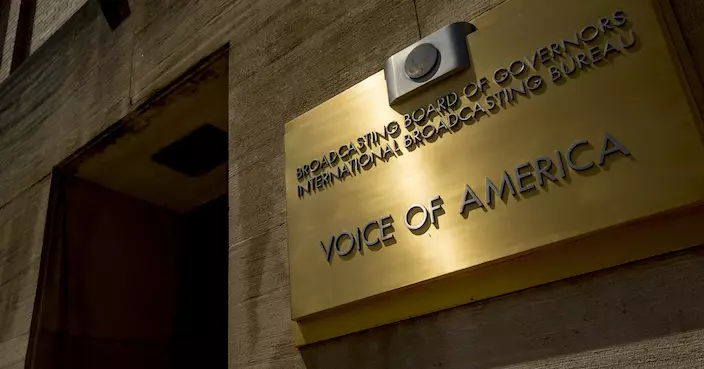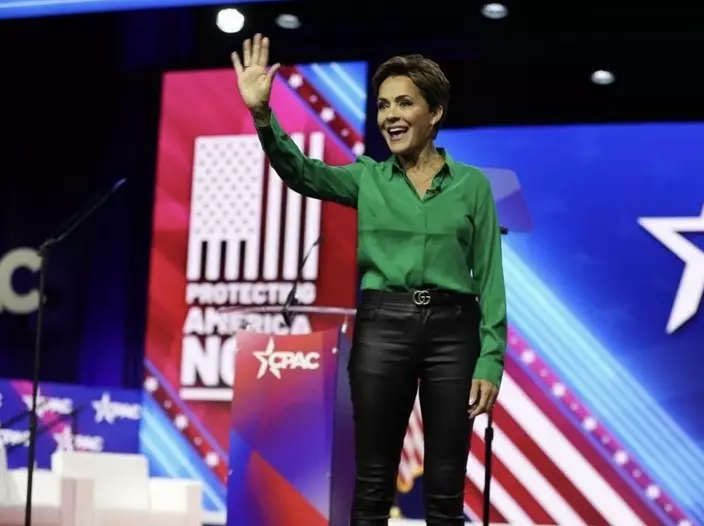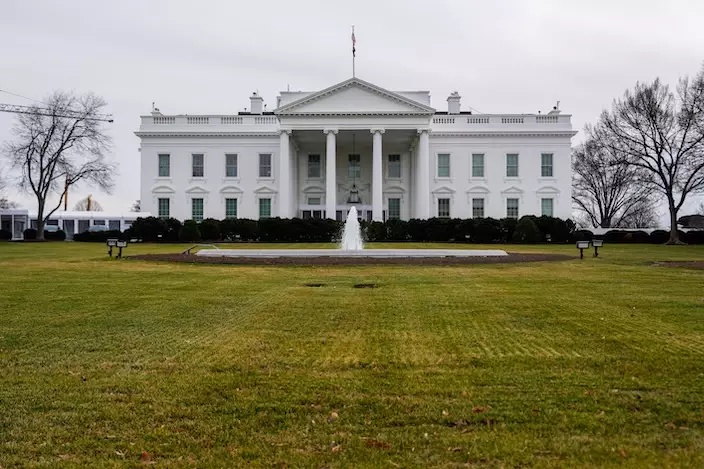The Trump administration has launched a dramatic restructuring of the Voice of America (VOA), dismissing nearly 600 employees and listing the broadcaster’s historic Washington headquarters for “accelerated disposal”, marking the most significant shakeup in the agency’s 80-year history.
Mass Layoffs Strike VOA
On Thursday, according to major US media outlets including The New York Times and The Washington Post, close to 600 contractors were terminated by the US Agency for Global Media (USAGM), VOA’s parent organization. This accounts for more than a third of VOA’s total workforce, which numbers about 1,350. Among those being laid off were primarily journalists, editors, and designers. As many as 50 of those affected are on J-1 visas and now face deportation within 30 days.

Nearly 600 contract workers at VOA and USAGM have been laid off, and the headquarters building has been listed for “accelerated disposal.” (AP file photo)
Headquarters Put Up for Sale
On the same day as the layoffs, Bloomberg reported that the Trump administration announced plans to sell the Wilbur J. Cohen Federal Building, VOA’s headquarters since 1954, as part of a broader push to shrink the federal government’s real estate holdings. The building, located just south of the National Mall, also houses USAGM and the Department of Health and Human Services.
Executive Orders and Editorial Overhaul
Last year, the Biden administration negotiated a 15-year lease for a new, modern headquarters for VOA in Washington. However, in March this year, Kari Lake, Trump’s senior adviser and his nominee to lead USAGM, canceled the lease, citing Trump’s directive to downsize operations to the minimum as legally required. She said she'd discovered "obscene overspending" of VOA, including a nearly quarter-of-a-billion-dollar lease for a Pennsylvania Avenue high-rise that has no broadcasting facilities to meet the needs of the agency, and a $9 million commission to a private real estate agent with connections.
Even if VOA survives legal and congressional challenges to Trump’s budget cuts, it may lose its permanent office space, leaving its employees and contract staff “homeless”.

Kari Lake, Trump’s senior adviser and his nominee to head USAGM. (IG photo)
Lake has further signaled a shift in editorial direction, indicating that VOA and other federally run broadcasters may be shuttered entirely. In the interim, she has proposed relying on One America News Network (OANN), a pro-Trump cable outlet, to serve as a media platform for government programs.
Wider Property Sell-Off Underway
In recent weeks, other federal properties, including courthouses in Los Angeles and Cleveland, a food safety lab in St. Louis, and the Department of Housing and Urban Development headquarters in Washington, have also been listed for sale.
Bloomberg reported that The General Services Administration (GSA), which acts as the federal government’s real estate agency, had previously listed 443 properties for possible sale, though the list was briefly withdrawn and is now being processed more cautiously. Federal law requires that surplus properties must be offered first to government and nonprofit organizations before being sold to private bidders, but the GSA said the accelerated process allows regulatory requirements to proceed in parallel with buyer inquiries.
Musk Backs Trump’s Anti-VOA Stance
USAGM’s stated mission is to “tell America’s story” and promote democracy and freedom worldwide. In reality, however, it often targets US adversaries with information campaigns, sometimes fueling unrest or supporting “color revolutions.” During his first term, Trump repeatedly criticized VOA for “spending tax money to promote foreign propaganda”. At a press conference on April 15, 2020, he directly singled out VOA, declaring that “things they say are disgusting toward our country.”
Since Trump’s return to the White House, Elon Musk and his Department of Government Efficiency (DOGE) have pushed for sweeping government restructuring, including mass layoffs. As early as February, Musk posted on X that VOA and Radio Free Europe were wasting taxpayer funds and should be shut down entirely.
Deep Throat
** The blog article is the sole responsibility of the author and does not represent the position of our company. **
Trump wasted not one second after US forces grabbed Venezuelan President Nicolás Maduro. He made it clear that he was eyeing the country's oil riches. But here's the catch: America's biggest oil companies aren't biting. Industry analysts confirm what the companies won't say publicly—even if these firms wanted back in, Venezuela's crumbling infrastructure and chaos on the ground mean Trump's fantasy of quick oil profits is far from easy to come true.

Trump promises Big Oil will pour billions into Venezuela. The oil giants say they never got the memo. AP Photo
Minutes after the military operation wrapped, Trump stood at a press conference making promises. Major American oil companies would pour into Venezuela, he declared, investing billions to fix the country's shattered oil infrastructure "and start making money for the country". Meanwhile, he reiterated that the US embargo on all Venezuelan oil remains in full effect.
Those sanctions have crushed Venezuelan exports into paralysis. Documents from Venezuela's state oil company and sources close to the situation confirm storage tanks and floating facilities filled up fast over recent weeks. Multiple oil fields now face forced production cuts.
White House Courts Reluctant Executives
Reuters revealed the Trump administration plans meetings this week with executives from major US oil companies. The agenda: pushing these firms to restore and grow oil production in Venezuela following the military action. The White House sees this as a critical step toward getting American oil giants back into the country to tap the world's largest proven oil reserves.
But Trump's eagerness hasn't translated into corporate enthusiasm. Several major US oil companies are taking a wait-and-see approach, watching Venezuela closely. ExxonMobil, ConocoPhillips, and Chevron all denied any prior communication with the White House about Venezuela. This directly contradicts Trump's claim over the weekend that he had already met with "all" US oil firms both before and after Maduro's capture.
Venezuela sits on roughly 17% of the world's proven oil reserves—first place globally. Yet US sanctions and other pressures have gutted its production capacity. Current output runs around 1 million barrels daily, barely 0.8% of global crude production.

World's largest oil reserves, strangled by US sanctions. Trump's quick-profit scheme hits a hard reality. AP Photo
Only One Company Stays Put
Chevron remains the sole major US oil company still operating Venezuelan fields. The firm has worked in Venezuela for over a century, producing heavy crude that feeds refineries along the Gulf Coast and beyond. A company spokesperson said on the 3rd that the current priority centers on "ensuring employee safety, well-being, and asset integrity," adding they "will continue to operate in accordance with laws and regulations."
ExxonMobil and ConocoPhillips previously invested in Venezuela. In the 1970s, the Venezuelan government nationalized the oil industry, reopened to foreign investment by century's end, then demanded in 2007 that Western companies developing oil fields form joint ventures with Venezuelan firms under Venezuelan control. ExxonMobil and ConocoPhillips pulled out. Neither company has responded to Trump's latest remarks about US capital entering Venezuela.
One oil industry executive told Reuters that companies fear discussing potential Venezuelan business at White House-organized meetings due to antitrust concerns.
Benefits Flow to First Mover
Francisco Monaldi, director of the Latin America Energy Program at Rice University's Baker Institute for Public Policy, expects Chevron would likely benefit first if Venezuela opens oil projects to the US. Other oil companies, he notes, will watch Venezuela's political situation closely and observe the operating environment and contract compliance before making moves.
Mark Christian, business director at an Oklahoma energy consulting firm, lays out the baseline: US companies will only return to Venezuela if they're certain of investment returns and receive at least minimal security guarantees. Lifting sanctions on Venezuela stands as a prerequisite for US companies re-entering that market.
Reality Check on Oil Profits
Even with sanctions lifted, the Trump administration won't find making money from invasion-acquired oil that easy.
Industry insiders admit large-scale restoration of Venezuelan oil production demands years of time and billions in investment, while confronting major obstacles: dilapidated infrastructure, uncertain political prospects, legal risks, and long-term US policy uncertainty.
Peter McNally, global head of industry analysis at Third Bridge, said, "There are still many questions that need to be answered about the state of the Venezuelan oil industry, but it is clear that it will take tens of billions of dollars to turn that industry around." He then added that it could take at least a decade of Western oil majors committing to the country.
Ed Hirs, an energy expert at the University of Houston, pointed to a pattern: US military invasions of other countries in recent years haven't delivered substantial returns to American companies. The history of Iraq and Libya may repeat itself in Venezuela.












